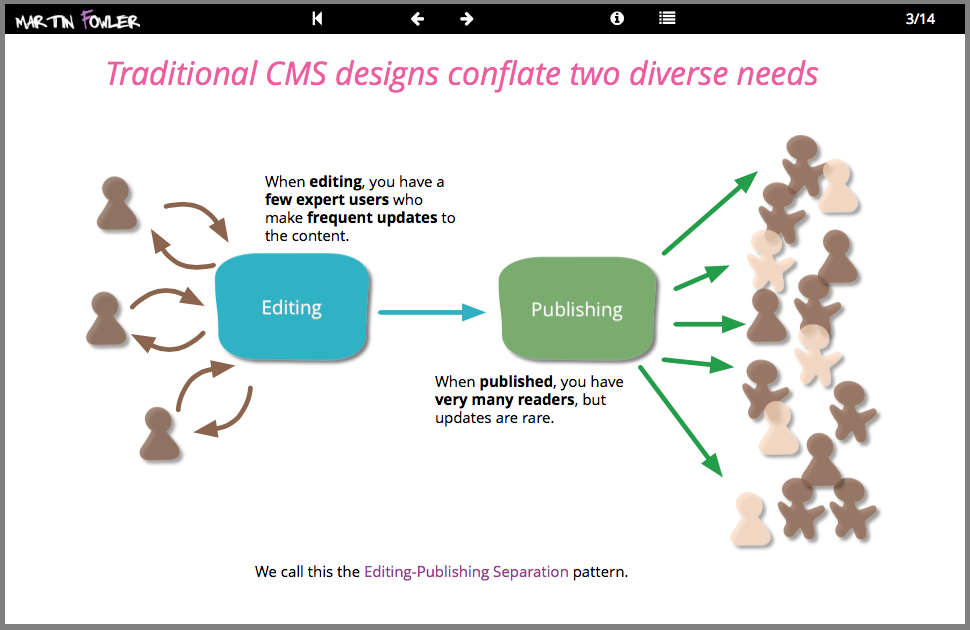tagged by: infodecks
Infodecks are a different form of web content, somewhat insipred by Powerpoint/Keynote slide decks, but written in a style that’s designed to be read without a speaker.
Testing Strategies in a Microservice Architecture

There has been a shift in service based architectures over the last few years towards smaller, more focussed "micro" services. There are many benefits with this approach such as the ability to independently deploy, scale and maintain each component and parallelize development across multiple teams. However, once these additional network partitions have been introduced, the testing strategies that applied for monolithic in process applications need to be reconsidered. Here, we plan to discuss a number of approaches for managing the additional testing complexity of multiple independently deployable components as well as how to have tests and the application remain correct despite having multiple teams each acting as guardians for different services.
Two Stack CMS

We build many websites with rich content, often using popular Content Management Systems (CMS). A recent project involved a marketing website for a global manufacturer which demanded complex interactive content with high availability and traffic needs. Our response was to apply the editing-publishing separation pattern and build two distinct stacks of software for content creation and delivery. In this deck you can see an overview of this architecture and our response to the issues of integration between the stacks, providing a secure preview of the live site, and handling the evolution and scaling of the system.
Workflows of Refactoring
Refactoring has grown into a well-known technique, and most software development teams at least claim to be doing refactoring regularly. Many teams, however, don't appreciate the different workflows that refactoring can be used in, and thus miss opportunities to effectively incorporate refactoring into their development activities. In this deck I explore various different workflows. I hope it will encourage teams to integrate refactoring more deeply into their work, resulting in a better designed code-bases that will make it quicker and easier to add new features.
The Architecture of Gap Inc's SCMS
SCMS PO is an application that helps Gap Inc. manage purchase orders. The architecture of the application is well liked by its development team and thus makes a good expositional architecture for a system with a rich javascript front end working with a back-end serving json. Interesting design features include using knockout.js form of the Presentation Model pattern, a javascript validator running on both client and server, encapsulating data access with repositories, using MongoDB as an application database, and the testing portfolio.
Eliminating Sales Commissions
Sales commissions are almost universally used in the software business, as in all business sectors. They are liked because they align incentives between sales staff and the companies that employ them. Nevertheless there are serious problems with the sales commission model, problems that led Thoughtworks to get rid of all sales commissions in 2013.
Thinking about Big Data
"Big Data" has leapt rapidly into one of the most hyped terms in our industry, yet the hype should not blind people to the fact that this is a genuinely important shift about the role of data in the world. The amount, speed, and value of data sources is rapidly increasing. Data management has to change in five broad areas: extraction of data from a wider range of sources, changes to the logistics of data management with new database and integration approaches, the use of agile principles in running analytics projects, an emphasis on techniques for data interpretation to separate signal from noise, and the importance of well-designed visualization to make that signal more comprehensible. Summing up this means we don't need big analytics projects, instead we want the new data thinking to permeate our regular work.
Schemaless Data Structures

In recent years, there's been an increasing amount of talk about the advantages of schemaless data. Being schemaless is one of the main reasons for interest in NoSQL databases. But there are many subtleties involved in schemalessness, both with respect to databases and in-memory data structures. These subtleties are present both in the meaning of schemaless and in the advantages and disadvantages of using a schemaless approach.
The Future is not NoSQL but Polyglot Persistence
An infodeck on the future of data storage in the enterprise, written primarily for those involved in the management of application development. Explains why relational databases have been the dominant, why NoSQL is challenging this assumption and sketches out the future of Polyglot Persistence, where multiple data storage technologies will be used for applications depending on their varied needs.
Multiple Mobiles
Mobile devices are increasingly important as a platform for customers and employees to use software services. Lots of people are busy building mobile applications, but also lots of vendors are busy building mobile devices. This range of mobile devices presents a challenge - how do you support lots of mobile devices?
Infodeck
When I rant on at my colleagues about the evils of Slideuments, I do hear a useful push-back. Many people now like to communicate through slide decks that aren't meant to be used for presentations, just to be read. People like me can snark about managers these days being unable to read anything that doesn't look like a bullet point, but there are advantage to these infodecks.
